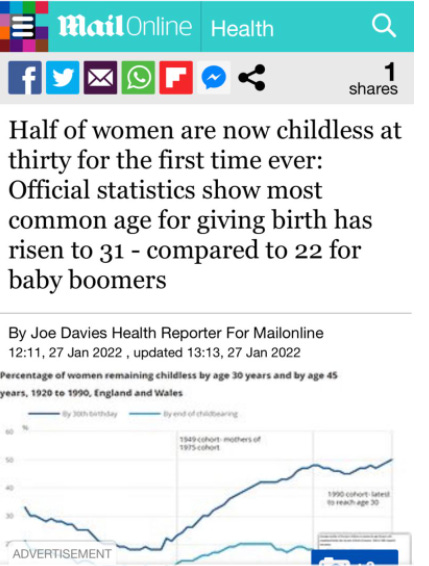Wealthy widows, child free @30 and why the generations inhabit different worlds

By 2025 60% of the UK's private wealth will be in female hands
40% of grandmas provide regular childcare for their families while 13% of Baby Boomer women looked after older relatives during lockdown
Number of Baby Boomer women divorcing increased by 30% between 2005-2015
Women outnumber men 3:1 in nursing homes.
Women make up 50% of UK landlords but only 8.5% of crypto-currency investments
Baby Boomer female bankruptcy has increased by 88% over the last decade
There has been an increase of 132% of Baby Boomer 'granpreneurs'; the fastest rise in any demographic.
Widows are the new powerbrokers. As chief carers in society, the inheritance economy is about to become a predominantly female one. Likewise though, the social care crisis is a predominantly female one. Baby Boomer women are the pioneers of the new age of old age in the 21st century.
For my full investigation into the rise of the Great Gender Wealth Transfer, the report is downloadable here.
Headline from the Daily Mail this week .....

‘Childless at thirty’ is such a loaded headline. How about celebrating the fact that women are taking the time to make the right decision? (whatever that is). … There’s a reason why divorce peaked amongst Baby Boomers in the 1980s. 'Too Much, Too Young' as The Specials put it.
There’s a narrative that has been developing for at least 20yrs over women having to choose between wanting a career and family. Two stereotypes are depicted in popular culture - the ‘desperate’ Bridget Jones-type who can’t find a man and becomes increasingly desperate in her thirties or the ‘soulless’ corporate type who just wants a career and leaves it too late. There’s as much subtlety in these stereotypes as the historic depiction of women as either virgins or whores. The real reason women find it impossible to have both (easily) is that structural forces in society, law and the workplace make it near impossible. And this is not a new problem, affordable pre-school childcare for example is something that working mothers have been fighting for since the 1970s.
Stuff I've Consumed....
1. You can read my thoughts on pandemic epiphanies and changing your career mid-life in an insightful article by Sarah Bailey highlighting how those in their fifties are deciding to take the plunge and switch careers late in life. The 'grey-giggers' are the ones really making a success of the gig economy.
2. Coronnials: Children born during the pandemic have seen a significant drop in I.Q - a dramatic 22 points compared to babies born in previous years, according to a U.S. study. Lack of interaction, conversation and too much TV was cited. As one researcher remarked: “the closest thing we’ve seen in other research...is the studies that were done of orphans in Romania. The effects of institutionalisation and lack of interaction on them were profound, but what we’re seeing here is on par with that.”
3. As a nation of commuters, we might assume that the UK was ahead of the curve on the flexible working front but apparently they lag well behind their EU counterparts. Samsung's European-wide survey has found that in terms of adoption and success, Brits have been slow to adapt with 88% of UK employees saying that they think their employer could do more, particularly in establishing work/life boundaries.
4. Content on the work front: How the Great Resignation is turning into the Great Reshuffle and what the CEO of LinkedIn thinks of it. The FT's lowdown on the Reddit 'anti-work' movement and why sabbaticals aren't just for academics and vicars but increasingly on the demand list for employees. But if you really want to keep your employees happy, this list makes a lot of sense.
Fastest Growing Professions in the UK

Via @Robertcolville, here are the fastest-growing professions in the UK. Brexit has obviously sparked an increasing need for customs officers, but it's the gender division (in tech as well as HR) that is the most striking thing about this chart.
A Feast for the Senses
READING: Six days of Covid self-isolation meant that I finally got around to reading three books in January that had been gathering dust on my bedside table: Bobby Duffy's pioneering Generations (the data is incredible and myth-busting), Helen McCarthy's Double Lives - a lucid and important history of working motherhood, and Noreena Hertz's timely call to arms The Lonely Century. All very different books launched in a pandemic but tell us so much about what direction our future should take.
LISTENING: To myself and a stellar panel of experts contributing to Amol Rajan's Radio 4's Rethink discussion on the pros and cons of a 100-year life.
VISITING: People IRL.
WATCHING: Well, very different stuff from Boomers and Gen Z apparently if the graph below on differences on generational media consumption habits is to be believed. Do read political scientist Paul Musgrove's illuminating full post on 'What the kids are reading'.
Thanks for reading, Eliza


